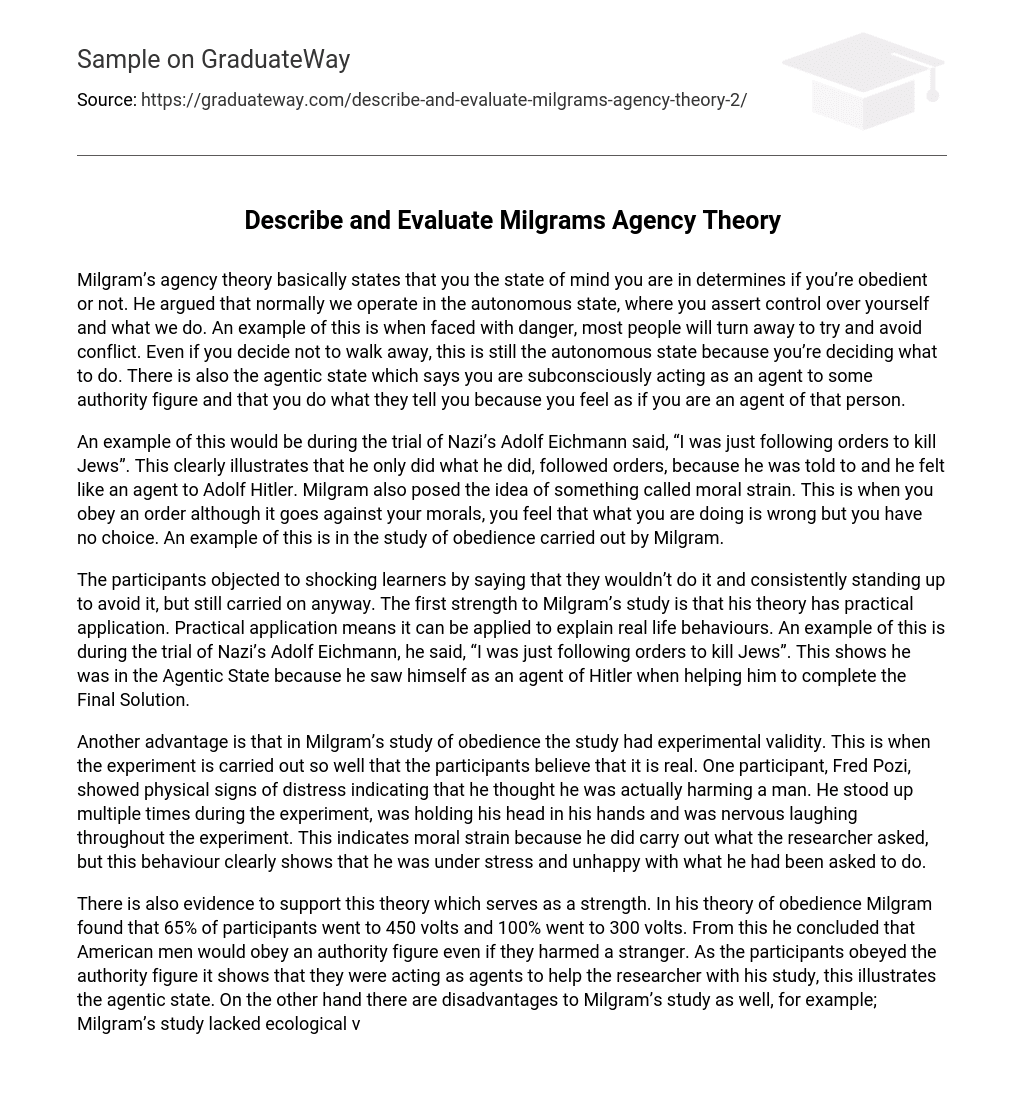Milgram’s agency theory states that your state of mind determines whether you are obedient or not. He argued that we typically operate in the autonomous state, where we assert control over ourselves and our actions. For example, when faced with danger, most people will try to avoid conflict by turning away. Even if you choose not to walk away, you are still in the autonomous state because you are making a decision for yourself.
On the other hand, there is also the agentic state which suggests that we subconsciously act as agents to authority figures and do what they tell us because we feel like we are representing them.
An example of this can be seen during the trial of Nazi Adolf Eichmann, who stated that he was only following orders to kill Jews. This clearly illustrates that he committed those atrocities because he felt like an agent to Adolf Hitler and had no choice but to obey. Milgram also introduced the concept of moral strain, which occurs when you follow an order that goes against your morals. You may feel that what you are doing is wrong, but you have no choice but to comply. This was evident in Milgram’s obedience study.
The participants objected to shocking the learners and consistently stood up to avoid it, but Milgram continued with the experiment anyway. One strength of Milgram’s study is its practical application. This means that it can be used to explain real-life behaviors. For example, during the trial of Nazi Adolf Eichmann, he claimed that he was just following orders when he helped carry out the Final Solution and killed Jews. This demonstrates that Eichmann was in an Agentic State because he saw himself as an agent of Hitler.
Another advantage of Milgram’s study of obedience is its experimental validity. This means that the experiment was conducted so effectively that the participants believed it to be real. Fred Pozi, one participant, exhibited physical signs of distress indicating that he believed he was truly harming someone. He stood up multiple times during the experiment, held his head in his hands, and nervously laughed throughout. This behavior suggests moral strain because although he carried out the researcher’s instructions, it is evident that he was under stress and unhappy with what he had been asked to do.
There is also evidence supporting this theory, which serves as a strength. In his theory of obedience, Milgram found that 65% of participants went up to 450 volts and 100% went up to 300 volts. From this, he concluded that American men would obey an authority figure even if they harmed a stranger. As the participants obeyed the authority figure, it shows that they were acting as agents to help the researcher with his study, illustrating the agentic state. However, there are also disadvantages to Milgram’s study; for example, it lacked ecological validity.
Ecological validity refers to the extent to which a study takes place in an environment that is familiar to the participants. In Milgram’s experiment, for example, Fred Pozi, a plumber by profession, would have been more comfortable in a house or bathroom than in a laboratory setting. As he was not in his natural environment, it is possible that his behavior might have changed as a result. This lack of ecological validity reduces the overall validity of the study since participants may not behave naturally under such conditions.
In addition to this issue with ecological validity, Milgram’s study also faced ethical concerns due to deception. Participants were not fully informed about what the study was actually researching and therefore did not give fully informed consent.
However, he performed a full debriefing at the end of the study, which rectified the problem. There is an alternative theory to the Agency Theory called The Social Powers theory. According to this theory, authority figures use reward power to gain obedience. Reward power is when an authority figure uses a reward to get a person to obey. For instance, when a parent says if you do your homework, you can go to your friend’s house.” The Social Powers theory suggests that it is power and not the mental state of someone that leads to obedience. Therefore, Milgram’s theory is incomplete.





